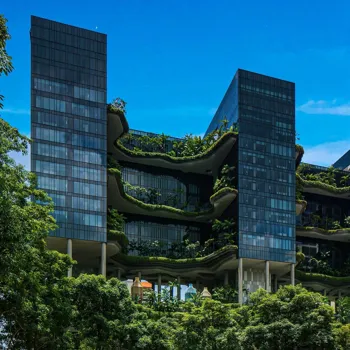Discover how India's sustainable business landscape is evolving with 7 innovative transformations. Read more to explore the future!
New Delhi: The call for sustainable business practices is not just a fad
anymore; it's a necessity. Companies across India are realising that long-term success depends on embracing methods that protect the environment and benefit society.
With growing concerns about climate change and resource depletion, innovation is playing a crucial role in reshaping industries for a greener future.
From renewable energy solutions to circular economy models, Indian businesses are finding creative ways to minimise their environmental impact and create positive social change. Let us explore seven innovations that are paving the way for a more sustainable business landscape in India.
Renewable Energy Integration:
India's commitment to renewable energy is becoming increasingly evident in the business world. Companies are actively integrating solar, wind, and hydropower into their operations. This shift reduces reliance on fossil fuels and lowers carbon emissions.

Factories are installing rooftop solar panels to power their production processes, offices are using renewable energy for cooling and lighting, and transportation fleets are transitioning to electric vehicles. This minimizes harm to the environment.
Several Indian IT companies are now running their data centers on 100% renewable energy, setting a precedent for others to follow.
Beyond internal consumption, businesses are also investing in renewable energy projects to supply clean energy to the grid, thereby contributing to India's overall renewable energy targets.
Government initiatives, such as subsidies and tax incentives, are further encouraging businesses to adopt renewable energy solutions. This not only reduces their carbon footprint but also enhances their brand image and attracts environmentally conscious consumers.
As the cost of renewable energy technologies continues to decline, more and more Indian businesses are expected to embrace this sustainable pathway. Also, investing in wind energy farms helps reduce cost of electricity, and will help to use clean energy. With reduced harm to nature, the future seems secured
Circular Economy Models:
The traditional "take-make-dispose" linear economy is becoming outdated. Indian businesses are increasingly adopting circular economy models that focus on reducing waste, reusing materials, and recycling products.

This approach aims to create a closed-loop system where resources are kept in use for as long as possible. For example, some companies are designing products that are easy to repair, upgrade, and disassemble, extending their lifespan and reducing the need for new materials.
Others are implementing waste management programs to collect and recycle their waste materials, turning them into valuable resources.
Electronic waste, a major environmental concern, is being addressed through specialized recycling facilities that recover precious metals and other materials from discarded electronics.
Businesses are also collaborating with suppliers and customers to create closed-loop supply chains, where waste from one process becomes a raw material for another. This reduces the demand for virgin resources, minimizes waste disposal, and creates new economic opportunities.
By adopting circular economy principles, Indian businesses can not only reduce their environmental impact but also improve their resource efficiency and create more resilient supply chains. Also, plastic waste can be converted to plastic pallets and can be used while transporting finished goods. The circular economy helps industries reduce raw material consumption, reducing harm to nature
Green Buildings and Infrastructure:
The construction sector is a significant consumer of resources and contributor to greenhouse gas emissions. Indian businesses are now embracing green building practices to create more sustainable and energy-efficient structures.

Green buildings incorporate features such as energy-efficient lighting and HVAC systems, rainwater harvesting, solar water heating, and the use of recycled and sustainable building materials. These features help to reduce energy consumption, water usage, and waste generation.
Green buildings also provide healthier and more comfortable indoor environments for occupants, improving their productivity and well-being. Several Indian cities are witnessing the rise of green office buildings, shopping malls, and residential complexes.
Government initiatives, such as green building ratings and incentives, are encouraging developers to adopt sustainable construction practices.
Beyond buildings, infrastructure projects are also incorporating green principles, such as the use of recycled materials in road construction and the implementation of smart transportation systems.
By embracing green building and infrastructure practices, Indian businesses can significantly reduce their environmental impact and create more sustainable and livable cities also, the construction material can be recycled from demolished buildings, using it in new construction activities. Using eco friendly construction material can reduce building temperature
Sustainable Agriculture and Food Systems:
Agriculture is a vital sector in India, but it also faces significant sustainability challenges, such as water scarcity, soil degradation, and greenhouse gas emissions. Indian businesses are investing in sustainable agriculture practices to promote environmental protection and food security.

This includes adopting organic farming methods, promoting water conservation techniques, and using integrated pest management strategies. Organic farming avoids the use of synthetic pesticides and fertilizers, reducing environmental pollution and promoting soil health.
Water conservation techniques, such as drip irrigation and rainwater harvesting, help to reduce water usage in agriculture. Integrated pest management strategies use natural methods to control pests, minimizing the use of harmful pesticides.
Businesses are also working with farmers to improve their yields, reduce their costs, and market their products effectively. In the food processing industry, companies are adopting sustainable packaging materials, reducing food waste, and improving energy efficiency.
By promoting sustainable agriculture and food systems, Indian businesses can help to protect the environment, improve food security, and enhance the livelihoods of farmers. also, adopting zero tilling agriculture practice can help reduce global warming, and increase yield
Water Management and Conservation:
Water scarcity is a growing concern in India. Businesses are implementing water management and conservation strategies to reduce their water footprint and ensure the sustainable use of water resources.
This includes investing in water-efficient technologies, such as water-saving fixtures and closed-loop cooling systems. Companies are also implementing water recycling and reuse programs to treat wastewater and reuse it for non-potable purposes, such as irrigation and industrial cooling.
Rainwater harvesting is another important strategy for capturing and storing rainwater for future use. Businesses are also working with communities to promote water conservation awareness and encourage responsible water usage.
In water-intensive industries, such as textiles and paper, companies are adopting cleaner production technologies to reduce their water consumption and pollution.
By embracing water management and conservation practices, Indian businesses can help to address water scarcity challenges, protect water resources, and ensure the long-term sustainability of their operations. also, creating awareness programs in schools can help to save water
Sustainable Supply Chain Management:
Businesses are increasingly recognizing the importance of sustainable supply chain management, which involves incorporating environmental and social considerations into their sourcing, production, and distribution processes.
This includes working with suppliers who adhere to environmental and social standards, promoting ethical labor practices, and reducing the environmental impact of transportation and logistics. Companies are conducting audits of their suppliers to ensure compliance with sustainability standards.
They are also providing training and support to their suppliers to help them improve their environmental and social performance.
In transportation and logistics, businesses are adopting fuel-efficient vehicles, optimizing delivery routes, and using alternative transportation modes, such as rail and waterways, to reduce carbon emissions.
By implementing sustainable supply chain management practices, Indian businesses can enhance their brand reputation, reduce their risks, and contribute to a more sustainable and equitable global economy.
Technology and Innovation:
Technology and innovation are playing a crucial role in driving sustainability across industries. From artificial intelligence (AI) to the Internet of Things (IoT), new technologies are enabling businesses to optimize their resource usage, reduce waste, and improve their environmental performance.

AI can be used to analyze data and identify opportunities for energy efficiency, waste reduction, and water conservation. IoT devices can be used to monitor and control energy consumption, water usage, and pollution levels.
Businesses are also investing in research and development to create new sustainable technologies and solutions. This includes developing new materials, processes, and products that are more environmentally friendly.
By embracing technology and innovation, Indian businesses can unlock new opportunities for sustainability and create a more resilient and prosperous future also, using digital technologies for audits can help reduce travel cost, and carbon emission.
Conclusion:
The future of sustainable business in India is bright, with a growing number of companies embracing innovative practices to protect the environment and create positive social change.
From renewable energy to circular economy models, Indian businesses are finding creative ways to minimize their environmental impact and build a more sustainable future.
As awareness of sustainability issues continues to grow, and as new technologies emerge, Indian businesses will play an increasingly important role in shaping a greener and more equitable world.















